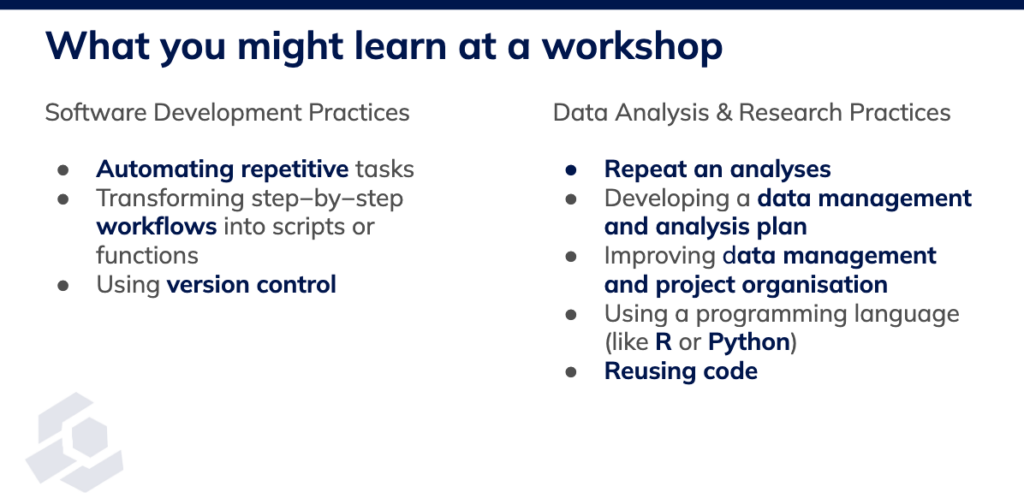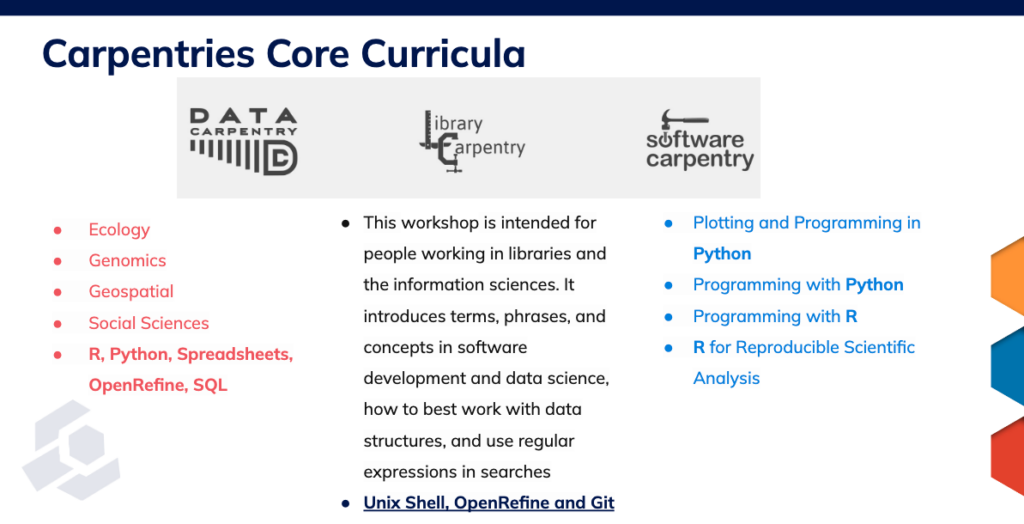Angelique Trusler, community manager at The Carpentries in Africa, shared insights on how researchers can start their data and coding skills journey. Attendees learned fundamental coding techniques that would help streamline their research workflow and the effective data management strategies to organize and analyze their data. Practical tips on using open-source tools to enhance research capabilities were also shared.
Watch the recording
The slides are available at https://africarxiv.ubuntunet.net/handle/1/1683
Speaker’s profile
Dr. Angelique Trusler, with a Ph.D. in Educational Psychology, is the Community Manager at The Carpentries in Africa and a Researcher at North-West University in South Africa. She leads efforts to enhance researchers’ data science skills across Africa, organizing workshops and training programs. Under her leadership, The Carpentries in Africa has grown significantly, hosting over 200 workshops and certifying more than 160 instructors.
Dr. Trusler also spearheaded translating a computing glossary into seven African languages, including Afrikaans, Setswana, isiXhosa, isiZulu, Amharic, Kiswahili, and Southern Sotho, and hosted a major virtual event, CarpentryConnect South Africa 2021, with participants from 28 countries. Passionate about open science, she collaborates with researchers to improve data science education and research, aiming for universal access to these crucial skills.
ORCID: 0000-0003-2340-8538
Linkedin: /in/angelique-trusler-phd-62996942/
Questions that were addressed during the session:
How do The Carpentries’ training programs support researchers in building essential coding and data skills?
Carpentries Instructor Training has the following goals:
- Introduce you to evidence-based teaching practices.
- Teach you how to create a positive environment for learners at your workshops.
- Provide opportunities for you to practice and build your teaching skills.
- Help you become integrated into the Carpentries community
- Prepare you to use these teaching skills in teaching Carpentries workshops.
The Carpentries teaches workshops worldwide on the foundational skills to work effectively and reproducibly with data and code. Our certified volunteer Instructors are trained in pedagogy and focus on creating a motivating and engaging environment for learners.
Our workshops are inclusive and hands-on, empowering students to learn new skills and build confidence in using them in their work.
The Carpentries lessons are collaboratively developed – anyone can contribute, and we receive contributions daily.

What are some of the most common challenges African researchers face when learning coding and data science, and how do The Carpentries address these challenges?
African researchers often face challenges such as limited access to reliable internet, up-to-date hardware, and tailored educational resources. The Carpentries address these by offering inclusive, hands-on workshops, open-access curricula, and a supportive global community that builds local capacity through instructor training and mentorship.
Here are a few reports by participants about how The Carpentries’ workshops have positively impacted research practices in Africa:
- Wins and Challenges of Running a Carpentry Workshop in South Africa during Load Shedding
- Reflections on my First Data Carpentries Workshop
- Lessons Learned – Data Carpentries Workshop for SADiLaR
- Learners’ Experiences from South Africa’s Online Workshop
- Read more at the Carpentries’ blog posts about Africa and The Carpentries in Africa in The Carpentries Handbook.
How does The Carpentries incorporate open-source tools into its training, and why are these tools important for researchers?
The Carpentries incorporate open-source tools like R, Python, Git, and Jupyter Notebooks into their training to teach foundational coding and data skills in a cost-effective and collaborative way. These tools are important for researchers because they promote reproducibility, transparency, and accessibility in scientific work without the barrier of expensive software licenses.

What strategies does The Carpentries use to ensure its training programs are accessible and effective for diverse research communities, including those in Africa?
The Carpentries Toolkit of IDEAS (Inclusion, Diversity, Equity and Accessibility Strategies) is a practical resource for Carpentries’ Instructors, helpers, and workshop hosts. We know that many people care about inclusion, diversity, equity and accessibility but are not sure how it connects to teaching foundational coding and data science skills.
This toolkit aims to bridge this gap. This is version 2, and our hope is that the Core Team and community members will continue to update and extend this resource over time.
Strengthening Research Capacity in Africa with The Carpentries Training Programs
Strengthening Foundational Data and Coding Skills
The Carpentries’ approach emphasizes building strong foundational skills in data handling, coding, and computational thinking. African researchers and institutions can learn structured, beginner-friendly methods to teach and learn critical tools like Python, R, SQL, and data management best practices. Strengthening these core skills helps researchers produce high-quality, reproducible research and prepares institutions to offer more robust digital training programs.
Building Local Communities of Practice
The session highlights how researchers and institutions can foster sustainable communities of practice by joining The Carpentries’ network. African institutions can benefit by training local instructors who can then lead regular workshops within their universities and research centers. This helps create a cycle of continuous skill development, mentorship, and peer learning, particularly important for maintaining long-term growth in technical capacity.
Promoting Inclusive and Accessible Training
One of the major lessons from the webinar was The Carpentries’ commitment to inclusive, accessible education. African researchers and institutions can adopt these values by ensuring their training environments are welcoming to people from diverse backgrounds, disciplines, and skill levels. Learning from The Carpentries’ global practices helps African institutions lower the barriers to entry for coding and data science training, making technology skills more broadly available.
Leveraging Open Educational Resources (OER)
The Carpentries openly shares its curriculum under Creative Commons licenses. Researchers and institutions across Africa can freely access, adapt, and remix these high-quality teaching materials to suit their local needs. This means universities, research hubs, and learning centers can quickly set up workshops, integrate open lessons into their teaching, and customize resources to align with local research priorities and languages.
Connecting with a Global Network
Participating in The Carpentries activities connects African researchers and institutions with a global community of data and coding educators and learners. This fosters new collaborations, professional development opportunities, and exposure to international best practices in research computing. The session showed that being part of such a network can amplify African voices in global conversations about data science and open research.
Capacity Building for Research and Innovation
Through The Carpentries’ Instructor Training and mentorship programs, African institutions can develop internal expertise to run their own scalable data and coding programs. This builds institutional resilience and enhances local capacity for research innovation. Researchers also benefit personally by gaining skills that make them more competitive for grants, collaborations, and publication opportunities in data-intensive fields.
About the webinar series
This webinar was co-organized by UbuntuNet Alliance and Access 2 Perspectives as part of the ORCID Global Participation Program.
ORCID is the persistent identifier for researchers to share their accomplishments (research articles, data, etc with funding agencies, publishers, data repositories, and other research workflows.
AfricArXiv is a community-led digital archive for African research communication. By enhancing the visibility of African research, we enable discoverability and collaboration opportunities for African scientists on the continent as well as globally.

